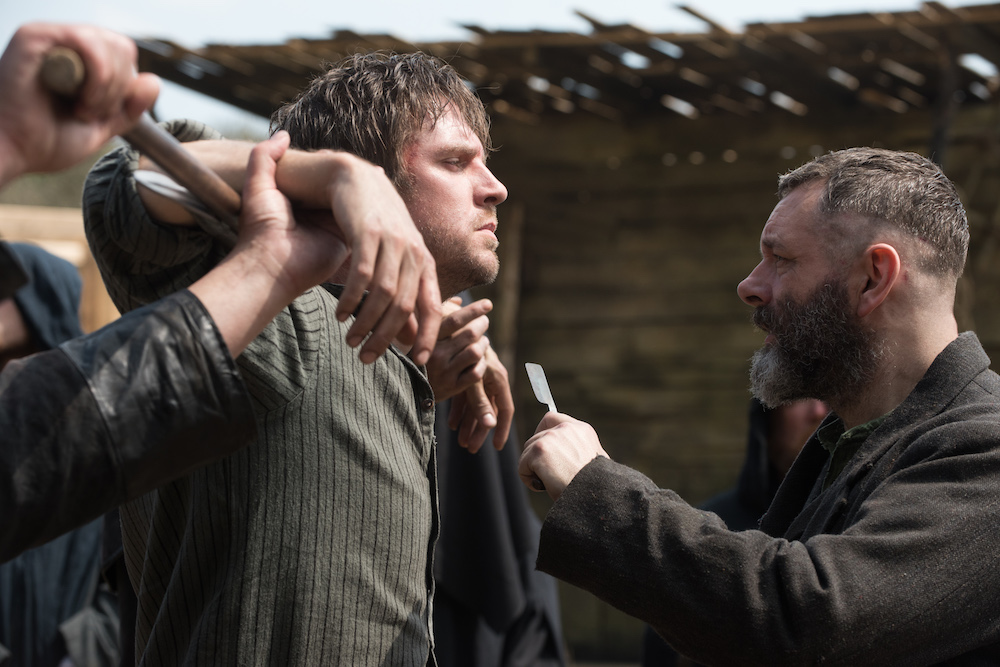Film Review: ‘Apostle’
By Peter Debruge
LOS ANGELES (Variety.com) – After a failed first feature that practically no one saw, Welsh director Gareth Evans traveled all the way to Jakarta to jump-start his career, helming a stunning trio of whiplash-fast action movies featuring the Indonesian martial art of silat — “Merantau,” “The Raid” and “The Raid 2” — that established him as a cutting-edge choreographer of break-yo’-face beatdowns. Turns out that’s not all he can do, not by a long stretch.
Gopher-bombing whatever pigeonhole Hollywood might’ve stuck him in, Evans has found his way back to the British Isles, switching genres entirely with “Apostle,” a Gothic horror mystery that’s less like an adrenaline shot to the heart than a rusty, hand-cranked drill to the skull. Just in time for Halloween, Evans eschews his signature brand of hyper-kinetic pugilism in favor of suspenseful, long-fuse mind games, offering the growing cult of Netflix subscribers this stylishly deranged black mass, which plays like an homage to “The Wicker Man” (the 1973 original, not Nicolas Cage’s notorious 2006 “bee movie“ remake) with better costumes, creepier customs, and a lot more blood.
In a forbidding corner of his native Wales, Evans invents the fictional isle of Erisden, a barely arable — and even less civilized — patch of far-flung turf where a false prophet named Father Malcolm (Michael Sheen, eyes blazing with lunatic fervor) has assembled a congregation of outcasts. So committed are Malcolm’s followers that they are willing to open their veins at his command, bleeding into jars in order to appease some unseen (for now) pagan goddess. Clearly, we’re dealing with some kind of cult here — but at least they believe in something, which is more than can be said of Thomas (Dan Stevens), a deeply scarred former missionary who surrendered his faith when the going got tough (he’s like the horror-movie version of Andrew Garfield’s soul-searching apostate in “Silence,” forced to confront the alternative to the God he abandoned).
If left to his own devices, the well-to-do Thomas would spend his days wallowing in opium dens, smoking away the damage of what his eyes have witnessed. Instead, he’s shaken from his stupor when his family receives a troubling letter from Erisden. Turns out, his sister Andrea (Lucy Boynton) is being held for ransom there, and so Thomas is dispatched — like Keanu Reeves in Francis Ford Coppola’s “Dracula” or so many turn-of-the-century literary heroes before him, a dandy unprepared for what lies ahead — to investigate her fate, and to make sense of the quasi religion Malcolm is using to hypnotize his followers.
Tantalizingly rich in atmosphere and altogether unhurried in revealing its secrets, the evocatively shot, ultra-widescreen “Apostle” will eventually veer into dark, mercilessly supernatural territory. Doing so lends a certain amount of credibility to the heathen community’s off-the-wall beliefs, which are based in forces that rational science can hardly explain, although there can be no question that neither Malcolm nor his power-hungry would-be successor Quinn (Mark Lewis Jones) truly understand how to deal with the wrathful “god” of whom they consider themselves the sole custodians.
In the meantime, Evans examines the rituals of Erisden through Thomas’ skeptical eyes, zeroing in on the way Malcolm manipulates his flock. As a genre, movies that deal with the threat of emerging cults not only present scary, satanic alternatives to organized religion but also remind that all orthodoxies had to start somewhere, potentially raising doubt about the foundations of more established faiths. (How different is the practice of ritual bloodletting from the Catholic sacrament of consuming the body of Christ?)
That’s a deeply unsettling subtext for a film that thrusts its lead character into unknown jeopardy: Thomas is a charlatan among zealots, trying to pass as one of them with little or no knowledge of what they practice. In one of the more terrifying scenes, Malcolm knows the island has been infiltrated and calls all of the new (male) arrivals to the chapel, where he asks them to recite passages from a gospel Thomas hasn’t bothered to memorize. If discovered, the impostor will be murdered on the spot.
Stevens is the only person here who looks remotely heroic,although he isn’t really cut out for the dramatic arc that lies ahead for his character, overplaying Thomas’ wide-eyed alarm and cheap-trick substance abuse to cartoonish, Bruce Campbell levels. Despite the very real threat of being found out, Thomas forges ahead in his attempts to locate Andrea — made all the more dangerous by his discovery of a young couple who’ve been carrying on a love affair in secret (this red-herring subplot, featuring Bill Milner and Kristine Froseth, seems to echo M. Night Shyamalan’s “The Village”), as well as his percolating attraction to Malcolm’s daughter Jennifer (Elen Rhys).
Technically, any one of these characters could prove to be the ally Thomas needs to survive a test the likes of which he cannot imagine. But by the time he comes face-to-face with the island’s bloodthirsty deity, all bets are off. Early on, as Evans establishes a dark flip side to the spirit of Edwardian enlightenment, the horror seems to be based in the groupthink of ignorant, easily impressionable souls. But what if what these superstitious Erisdenians aren’t entirely crazy? That’s where “Apostle” delivers something cult-centric cult movies like “The Wicker Man” and “Kill List” never could: It can break from reality and actually confront the source of their pagan beliefs.

